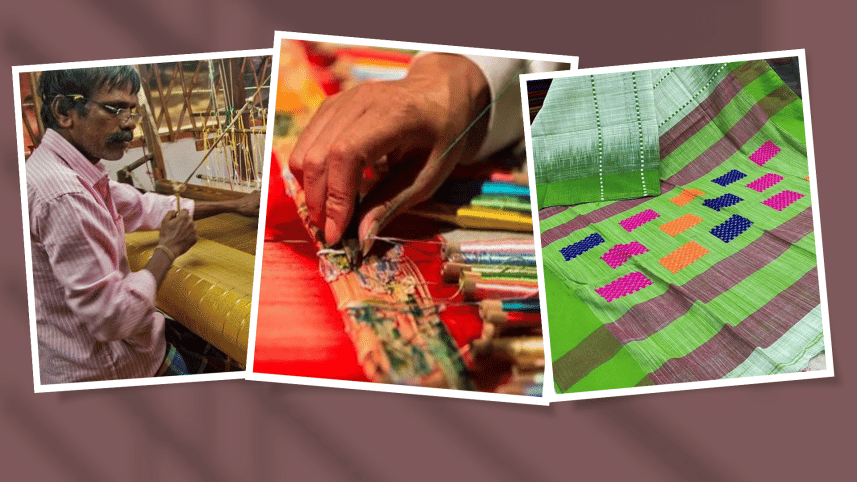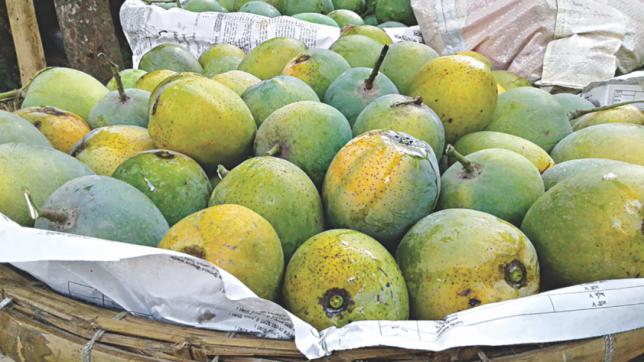Bring back our sarees

The Government of West Bengal in India has just got the geographical indication (GI) rights for the famous Tangail sarees of Bangladesh. The announcement came from the official Facebook page of India's Ministry of Culture on February 1. The post claims: "The Tangail saree, originating from West Bengal, is a traditional handwoven masterpiece. Renowned for its fine texture, vibrant colors, and intricate Jamdani motifs, it epitomizes the region's rich cultural heritage." Following this, Bangladeshi netizens expressed their outrage towards India on social media for getting GI rights of Bangladesh's own products on various social media platforms. According to Indian media sources, India has also gotten the GI rights for Sundarbans' honey last month.
The Tangail sarees are a significant cultural heritage of Bangladesh, not India. In the late 18th century, the zamindars of Tangail invited some muslin weavers from Dhaka to settle in Tangail and develop a new cloth. Many weavers migrated to Tangail and produced sarees which have a fine and smooth texture. Now, it is true that after the partition of India in 1947, many weavers migrated to India from Tangail and other parts of Bangladesh. They were resettled mainly in West Bengal. Phulia Tangail, near Shashipur, has become the new home of these weavers. In any case, this does not take away from the fact that the true origin of the Tangail saree is the Tangail region of Bangladesh, not West Bengal. But India has acted and it now has the GI rights, whereas the Bangladesh Handloom Board had no idea or plans to get GI rights for the saree.
GI rights can be very important for many reasons. The benefits that a country gets for registering items as GI products are primarily that, after recognition, that country becomes the owner of the associated product's intellectual property (IP). It raises the recognition and soft power of the country. That country also comes to own a massive share of the business profits of that product. No other country can claim ownership of the IP in the international arena. Also, a differentiated reputation of the product is created. Producers get better prices for their products in the global market.
Geographical Indication Products or GI is one of the main branches of intellectual property. In general terms, a GI is a country's ownership or intellectual property of a particular product. According to Section 2(9) of the Geographical Indications Goods (Registration and Protection) Act, 2013, soil, water, climate and altitude of a particular territory of a country and the culture of the people there play the most important role in the production of a product. It is then recognised as a GI product of that country. Chamcham of Tangail, Rasmalai of Cumilla, Khaja of Kushtia, and the Black Bengal goat of Bangladesh have been recognised as GI products at the latest. With this, the total number of GI products in Bangladesh is 21.
Therefore, it is imperative that Bangladesh maximises its GI-recognised products. However, because of the geographical proximity between Bangladesh and India and a shared history pre-partition, there has been cultural exchange between the two countries. This creates confusion about the origin of some products. These products are called homonymous GIs. Both countries can claim GI rights on such products. However, if there is misleading or consumer confusion in the market by claiming a product, more than one country will not be able to claim it. India's action of registering these products as (just) its own can cause cross-border intolerance and pose a potential threat to Bangladesh's intellectual property rights. Although the TRIPS (Trade Related Aspects of Intellectual Property Rights) agreement is silent on such an issue, both countries should try to resolve it diplomatically. If this does not solve the problem, legal action should be taken to protect the rights of originality of the product. However, it remains to be seen if the present Bangladesh government has the will or ability to challenge Indian authority on the global stage.
To register as a GI product, first, an application should be made to the state agency on behalf of the government, and then an international intellectual property agency, which is the World Intellectual Property Organization (WIPO). The Department of Patents, Designs and Trademarks (DPDT) under the Ministry of Industries has been given the responsibility of registering GI products of Bangladesh from WIPO.
Article 27.3(b) of the WTO's (World Trade Organisation) Agreement on TRIPS provides legal rights pertaining to patenting biological processes. In this agreement, there is a provision to register the geographical indication laws to establish ownership of the respective country over the natural and man-made and agricultural products which have been produced for a long time in different countries of the world. According to the rules, in order to get the GI registration of a product, it is necessary to present historical and credible evidence that the product originates or is produced within the borders or territory of the country. The state agency responsible for granting GI registration must publish an article in its own journal with that credential.
If no objection is raised by any organisation or group from another country or no other organisation claims registration of the product within two months of its publication in the journal, then the product is registered in the name of the country that has published the article and sought GI registration. However, if the same product is produced by more than one country, the country that produces the product the most and the country in which the product is most popular will have priority in getting the rights. In the case of the Tangail saree, both conditions should apply to Bangladesh.
Although Bangladesh is rich in terms of history and tradition, since there had been no GI law for a long time, there was no opportunity to protect the ownership of GI products. Later, after the enactment of the Geographical Indications Products (Registration and Protection) Act, 2013 and the Geographical Indications Rules, 2015, the road for GI product recognition in Bangladesh was smoothened. Due to our lack of sufficient awareness and appropriate legislation, India has taken off around 66 GI products including nakshi kantha, Fazli mango and rashgolla.
The government should identify and register all our GI products immediately, otherwise we may see our intellectual rights and our heritage products being snatched away. The Tangail saree must be credited to the region it is named after and its intellectual rights must rest with its rightful owner: Bangladesh.
Aparajita Debnath is an advocate at Dhaka Judge Court.
Anupam Debashis Roy is a postgraduate student at the London School of Economics.
Views expressed in this article are the author's own.
Follow The Daily Star Opinion on Facebook for the latest opinions, commentaries and analyses by experts and professionals. To contribute your article or letter to The Daily Star Opinion, see our guidelines for submission.





 For all latest news, follow The Daily Star's Google News channel.
For all latest news, follow The Daily Star's Google News channel. 


Comments